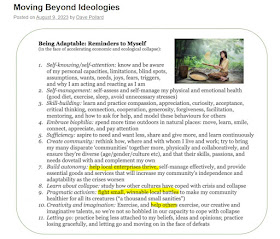One of the blogs I've followed since the late 2000s is written by Dave Pollard and is titled "How to save the world". That's a pretty big idea.
I include Dave's blog on my Inoreader page and looked at a recent article last week. Below is a screenshot of the top of the article which you can read at this link.
There's good advice in this list and in Dave's article. He quotes from another blog, titled "
So where do we go from here?" which you can find
in this link.
Below is one of the paragraphs from that blog that Dave included in his article.

He recommends acting locally, building a community focused on local problems, since the big problems are not likely to be solved by our current orchestra of political leaders.
So what does this have to do with volunteer-based tutor, mentor and learning programs? Everything.
The graphic below shows that while we launched the Tutor/Mentor Connection in 1993 to help volunteer-based tutor/mentor programs grow in all high poverty areas of Chicago, we were also launching a new program in the Cabrini-Green area to help 7th and 8th grade teens move through high school and into adult lives.
Our actions to help ALL programs were intended to help our SINGLE program, too.
When I became the volunteer leader in 1975 of a tutor/mentor program that already had 100 pairs of kids/volunteers, I held a full time retail advertising job with the Montgomery Ward corporation. As the tutor/mentor program grew to 300 pairs of kids and volunteers from 1975 to 1990, so did my job responsibilities. I had to find a way to enlist volunteers as leaders who would help other volunteers succeed in the program.
I enlisted other volunteers to help me organize and lead the program. This shows the tutoring program committee in 1976-77. By 1990 it had grown to include 3 or 4 times as many volunteers, coming from companies throughout the Chicago region.
And, I started building a library, sharing resources I was using to build my own weekly tutoring activities, and what I was learning from other tutor/mentor programs in Chicago, with the volunteers enrolled in my own program. I shared this information and pointed to 'recommended reading' via my weekly newsletters and encouraged networking events to help volunteers connect with each other.
I expanded this strategy to reach programs throughout Chicago when we formed the Tutor/Mentor Connection in 1993.
The strategy of the Tutor/Mentor Connection aimed to build visibility for all tutor/mentor programs in Chicago, including our own, to help each program attract and keep volunteers and donors.
This strategy was to PUSH resources directly to individual tutor/mentor programs, and to make them available to individual volunteers. They are the smallest unit of community change, via their one-on-one connection to kids.
We organized networking conferences and a public relations campaign to draw programs together and draw attention to the resources in our library.
I created this graphic a few years ago to visualize what I'm saying. Each volunteer- based tutor/mentor program is a small ecosystem, built around the connection of a single volunteer, or group of volunteers, with a single youth, or group of youths.
The volunteers who serve on Boards of Directors, and the volunteers who work directly with kids, have a range of talent that can help programs do more to help kids, if that talent is mobilized.
As I shared information via print newsletters in the 1970s and 1980s, then email in the 1990s and websites, blogs and social media since then, I used the weekly tutor/mentor sessions to connect in one-on-one conversations with our volunteers.
We organized after tutoring social activities for volunteers and field trips that connected youth and volunteers with each other, all to help build bonds and relationships and encourage people to dig deeper into information they could use to be a more effective volunteer, or to help the tutor/mentor program grow.
Over the past decade I've expanded the
library of articles that show some of the "global" issues that need to be solved, which Dave's article offers pessimism that they "can be solved".
While these are global issues, they are also issues many of the kids in our tutor/mentor programs are facing. Educating volunteers and mobilizing their talent can lead to local actions that help kids, and linking programs can lead to a growing army of volunteers working to solve these problems at a larger level.
Thus, everyone who reads Dave Pollard's "How to save the world" article could be using their personal time, talent and treasure to help a single youth, or a group of kids who are part of an organized program. This is "acting locally" and can fill the map with many icons representing constantly improving tutor/mentor programs led by teams of talented, motivated volunteers and staff.
This begins with making sure well-organized tutor/mentor programs are reaching K-12 youth in more places. I encourage you to visit
this section on the Tutor/Mentor Institute, LLC website.
It includes PDF essays that share my own experiences and strategies that others can use to start and sustain on-going, constantly improving volunteer-based tutor, mentor and learning programs.
It's just a small part of the resource library that I've been building over the past 30 years.
Thanks for reading. Please share this article and these resources with your network.
And, connect with me on social media. I'm on Twitter, Facebook, Instagram, LinkedIn and more. Find links
on this page.
Finally, if you're able to make a contribution to support my work, visit
this page.










No comments:
Post a Comment